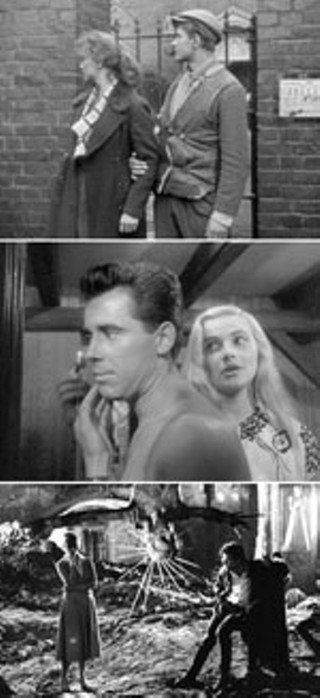Gift guide
By Shawn Badgley, Fri., Dec. 16, 2005

Andrzej Wajda: Three War Films
Criterion, $79.95
It's a trilogy that could never have conformed to the fashionably efficient shooting schedules of The Lord of the Rings and Pirates of the Caribbean, but to recognize that it came close – A Generation, Kanal, and Ashes and Diamonds were made and released during a five-year span (1954-1958) a decade after they're sequentially set – is to marvel at its maker's creative impulse and progression. Moreover, to hear Andrzej Wajda explain in A Generation's accompanying "On Becoming a Filmmaker" that he wasn't particularly interested, actually, in becoming a filmmaker, that he went to film school in Kodz "by chance" as a disillusioned twentysomething painting student, is to startle at the urgency his art would work off of.These character-driven depictions of the Ghetto Uprising of 1943, 1944's Warsaw Uprising, and the end of the war as Europe knew it in May of 1945 are nothing short of a young man's response to surviving one end of the world and finding another end of the world in what little was left of things. How the films themselves survived Soviet censors is another story altogether, and one of the many so colorfully told by Wajda – along with The Language of Film author Jerzy Plazewski and frequent assistant director Janusz "Kuba" Morgenstern – in the aforementioned 2003 interview supplement, apportioned to each of the three discs in this typically formidable Criterion set (which includes Wajda's student short "Ceramics From Ilza" and respective essays by Ewa Mazierska, John Simon, and Paul Coates).
"He altered its proportions," notes Plazewski of A Generation's first-time director confronting enforced socialist-realism standards while otherwise occupied by the likes of De Sica and Rossellini. And, thus, the Polish School was founded, with kids like Roman Polanski acting for the first time amid "real interiors, real streets"; live ammunition for, um, special effect; a compelling potion of neorealistic themes and "signifier"-heavy expressionism; as well as, it would seem, politically savvy smoke and mirrors.
That smoke and those mirrors were all but gone by 1956, mostly because Stalin was, and, operating from a point of view only his countrymen could truly decode, Wajda altered nothing but the lighting in the sewers of Warsaw. Kanal loses the baby fat of his debut and emerges lean, detached, and confident. "It's easier to die when you're in love," offers Halinka, a teenage Home Army fighter who has just come in possession of her own gun. It's a line that would have been embraced or, at worst, ignored, in A Generation. "Nonsense!" though, replies a compatriot here. "Melodrama." It's dismissive, much as Communist authorities must have been in vetting a bleak document of insurgents stuck between the rock of German aggression and the hard place of Soviet strategy. Cannes thought otherwise, awarding Kanal a Special Jury Prize alongside The Seventh Seal, and Wajda recalls it as a validating moment that renewed his still-shaky relationship with film. "Suddenly," he says, "the world came to know Polish reality from the most astounding angle."
The angle would get more astounding: 1958's Ashes and Diamonds (here with Annette Insdorf's commentary) stands as Wajda's masterpiece, its imagery bristling, hip, and haunting. Carried by Zbigniew Cybulski as Maciek Chelmicki – whom Wajda remembers as having almost rejected because his eyes were too small (tinted glasses took care of that) – as a Home Army assassin distracted from a hit on a Communist party secretary by a romance with Ewa Krzyzewska's Krystyna, the action happens in fewer than 24 hours. Like its predecessors, Ashes and Diamonds was adapted from a novel whose meaning Wajda made his own with a film he somehow made on his own terms. Unlike them, it didn't run its course in Western Europe, but rather in New York, Los Angeles, Tokyo, and beyond. In doing so, it joined just a handful of postwar films that would ignite a global cinematic explosion. Not a bad legacy, but also not the director's most enduring one: Taken together, A Generation, Kanal, and Ashes and Diamonds preserved a whole hard-luck country's sense of time, place, and worth when it looked for all the world that it might be lost forever.








